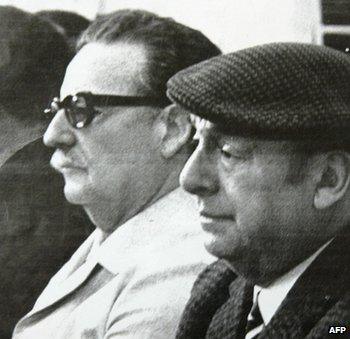Tests confirm Chilean poet Neruda had advanced cancer
- Published

Pablo Neruda (right) was a close friend of President Salvador Allende (left)
Forensic experts in Chile say initial tests on the remains of the Nobel prize-winning poet Pablo Neruda confirm that he was suffering from cancer at the time of his death.
The left-wing poet died in 1973, days after the military coup that brought General Augusto Pinochet to power.
Mr Neruda's remains were exhumed last month to investigate allegations that he was poisoned by secret agents.
It was thought at the time that he died of prostate cancer.
The findings that he had advanced cancer seem to support the official version that he died of natural causes.
But lawyer Eduardo Contreras, who brought the case on behalf of the Chilean Communist Party, said it was too early to reach a conclusion.
The result will be revealed in toxicology tests to be carried out at a laboratory in the United States, he said.
"It is no news that Mr Neruda had cancer. It is logical that the cancer will show in the X-rays of his bones," said Mr Contreras.
Lethal injection
The poet was a close friend of the overthrown Chilean President Salvador Allende. He died aged 69, just 12 days after Gen Pinochet's coup.
A close aide said the left-wing poet was given a lethal injection on Gen Pinochet's orders, but his family maintains the cause of death was cancer.
Neruda was buried next to his wife, Matilde Urrutia, in the garden of their home on the Pacific coast of Chile in Isla Negra, some 120km (75 miles) west of Santiago.
In 2011, Chile started investigating allegations by his former driver and personal assistant, Manuel Araya, that Neruda had been poisoned.
Mr Araya says Neruda called him from hospital, and told him he was feeling sick after having been given an injection in the stomach.
The allegations are backed by the Chilean Communist Party, which says that Neruda did not exhibit any of the symptoms associated with the advanced cancer he is reported to have died of.
They say the military government feared Neruda would go into exile in Mexico and campaign against the Pinochet regime.
- Published12 April 2013
- Published8 April 2013
- Published8 April 2013
- Published21 March 2013